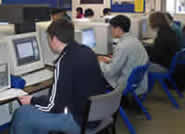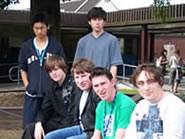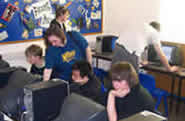Implementation

Jenny gave each email a descriptive title, edited them where required, and posted them on the school intranet where her students could easily access them. It was made clear that the postings were a general resource, and that students were not to email mentors directly.
Jenny also emailed back with a copy of her teaching timetable and an invitation to come and visit when convenient. This proved very successful.

The six Hillcrest students who won Waikato University Computer Science fees Scholarships in 2005, and who form part of Jenny's 2006 mentoring group. The Scholarships are worth $4,000 each and 10 are awarded nationally.
"Mostly they just turn up when they've got a bit of free time, bringing their laptops so they can demonstrate things to the students. This helps establish a link between what they are doing in class this year and what they could be doing next year when they leave school."
"One student this year has been helping the Year 12 students with C# ('C-sharp') - a computer language they're teaching at the University for the first time this year. He's shown the students at school the sorts of things he's doing and taught them how to do it. C# gives students the visual interface of Visual Basic which they use in Year 11. It teaches them about the code they're using in Action Script in Year 12, and gives them experience of what they're going to be doing next year in C++ in Year 13. It's turned out to be a really good intermediary between those two years." (see C# email )
The computer graphics student has been back several times during the year to show the artwork that he has been doing. He's been making current students aware of some of the broader skills required by his courses, such as photography and art and to show how at university he is now being taught these things to enhance his knowledge and skills in computer graphics. "A lot of boys, especially, get into computer graphics and just want to design computer games and don't think outside the square. Because of the narrow age gap between the mentors and the kids is they know what they are thinking and can try to get them to think a bit more widely, and the kids are more willing to listen."

Jenny takes advantage of the school's proximity to the university, by supplementing email based mentoring with visits from ex-students and willing university staff. A recent visitor from the Software Engineering Department at the University talked to the Year 12 and Year 13 programming classes about modelling.
"We've talked about modelling this year, and so far my students have used storyboards to create a model for a Flash animation. Now they're writing programmes and they're going to be once again modelling those for their NCEA assessment. The university lecturer uses finite state machines to model with. He explained that when you're doing software engineering and you're creating things like smart cards, which have no paper trail, or software for medical machinery, which is mission or 'safety' critical, you've got to model your software to make sure it's absolutely perfect before you code it. He was showing them the importance of the achievement standard criteria from a real life perspective."
Student survey:
Describe the type of contact you have had with the mentors?
- Vidur - Year 12
The emails give students like me an idea of what programming out of school and in the real world is actually like. - Nathan - year 12
MSN, email. Daniel has also come to school and my house to help me out with programming problems. - Bob - Year 12
When I was down last term it helped being able to read about other guys who were into programming when they were my age, see what Uni degree they did, and what jobs they ended up doing - programming video games, programming for IHUG, etc. - Renee - Year 13
Daniel came to school and helped me solve programming problems in C++. I was also able to read emails in our shared area from other students who left last year. Their emails told me what they're doing at Uni and about courses they're doing and they gave me other tips about ICT and Uni.
